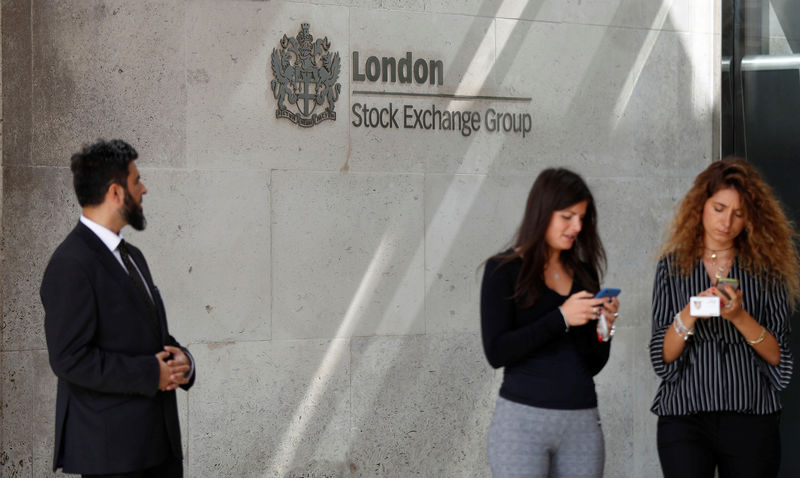(Reuters) - The FTSE 100 fell on Monday after early gains as a weaker dollar and lingering pessimism over the global economy crushed optimism surrounding pivotal U.S.-Sino trade talks, while mid-caps held on to some gains thanks to retailer Dunelm's strong results.
Britain's main index (FTSE) fell 0.4 percent while the mid-caps (FTMC) were up 0.5 percent by 1032 GMT.
As talks between the world's two biggest economies kicked off in Beijing on Monday, U.S. President Donald Trump's comments on Sunday that trade talks were "going very well" led to some cautious optimism among investors earlier in the session.
Although UK stocks opened higher, the FTSE 100 - which makes about 70 percent of its income abroad - erased early gains as a weaker dollar weighed on multinational heavyweights AstraZeneca (L:AZN), Reckitt Benckiser (L:RB), Unilever (L:ULVR), British American Tobacco (L:BATS) and Diageo (L:DGE).
Miners helped cushion the market's fall as metals prices climbed after China cut its reserve requirement ratios.
Overall investors had their doubts that trade talks would deliver a long-term solution, and some of Monday's falls were likely driven by traders taking profits after Friday's rally.
"Given the lowish status of the actual trade talk participants... I think markets are taking a more wait-and-see approach on this issue - which is by far the most important influence on global market direction in 2019," said Chris Bailey, a Raymond James analyst.
"Of course, the UK specifically has the Brexit curveball to deal with too."
Prime Minister Theresa May said on Sunday that Britain would be in uncharted territory if her Brexit deal is rejected by parliament later this month, despite little sign that she has won over sceptical MPs.
Stocks had recorded their best weekly gain in two months on Friday as strong U.S. jobs data and accommodative comments from U.S. Fed chief Powell boosted the market.
A top mover on Monday was homeware retailer Dunelm (L:DNLM) which surged 12 percent after earlier hitting its highest in nearly a year as it guided to a jump in first-half earnings, boosted by revenue growth in both stores and online.
"This performance by an established market leader is doubly impressive considering the unhelpfully mild autumn weather and generally uncertain UK consumer environment," wrote Stifel analysts.
Supermarket chain Sainsbury's (L:SBRY) added 2.3 percent, while Tesco (L:TSCO) and Morrisons (L:MRW) both rose 1.3 percent after German discount supermarket Aldi's
Retailers will be in focus this week with supermarkets and high street chains due to issue their Christmas trading updates, offering investors an insight into how the battered UK sector fared over the holiday.
Broker notes also drove some moves.
British Gas owner Centrica (L:CNA) tumbled 4.3 percent, topping the losers on the main index, after Jefferies downgraded the stock and HSBC (L:HSBA) dipped 2 percent after Citigroup (NYSE:C) cut its rating on the stock to sell.

M&A was a driver, with generator ContourGlobal (L:GLO) gaining 2 percent after a deal to buy energy plants from Mexican petrochemical company Alpek (MX:ALPEKA) for $801 million (£629 million).